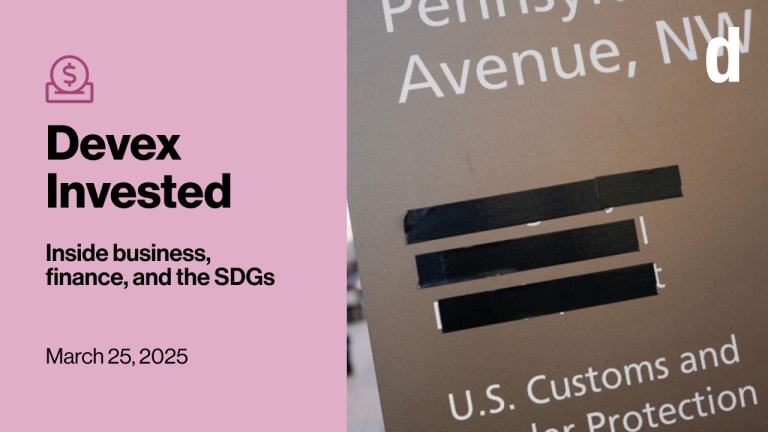
Among the perennial critiques of the International Finance Corporation — and other development finance institutions — are that it focuses too much on closing deals and too little on development impact, and that its organizational and incentive structures have led to underinvestment in low- and lower-middle-income countries.
This is a preview of Devex Invested
Sign up to this weekly newsletter inside business, finance, and the SDGs, in your inbox every Tuesday.
IFC’s current strategy, along with the requirements of its latest capital increase, push the institution to address some of those problems. A key part of that effort is IFC’s upstream work, aiming to create a pipeline of potential future projects by providing a mix of funding and technical assistance for them.
Last year, IFC hired more than 230 people to focus on upstream work. But the effort is still young, and both IFC and outside observers agree it’s too early to see the results.
• IFC’s traditional job is to use private sector financing to drive development, but it is “handicapped” if it doesn’t have projects to invest in, says Femi Akinrebiyo, a global manager for upstream work at IFC.
• This new way of operating through the upstream portfolio is proactive, letting staffers take a problem and find the companies and investments to tackle it, Akinrebiyo tells me. It also means taking more risk and accepting that success entails only about 25% of projects getting to the finish line, he says, and IFC needs to fail fast and learn from those that don’t work out.
• For the upstream work to succeed, IFC will need to prioritize development, improve transparency, and carefully weigh not just problems and solutions but whether the private sector is best positioned to tackle a specific challenge, Nadia Daar, the head of Oxfam International’s Washington office, tells me.
• And that won’t come easy. “There is a strong culture ... of deals over development” at IFC, requiring a culture shift that is still in its early stages, says Charles Kenny, a senior fellow at the Center for Global Development.
Read: To boost investment pipeline, IFC invests in upstream work [PRO]
Biden nominates DFC head
President Joe Biden has nominated a new CEO for the U.S. International Development Finance Corporation. Scott Nathan served in the State Department during former President Barack Obama’s administration as special representative for commercial and business affairs. He also worked for decades at The Baupost Group, a private investment company.
Nathan wasn’t among the names I’d heard for potential nominees. He’s clearly a more political pick and doesn’t have a development background, though that is not unusual for a DFC leader. At his nomination hearing, I’ll be listening for how he talks about DFC’s mandate and what his leadership may mean for the balance the agency is trying to strike between its foreign policy and development objectives. A date for the hearing has not yet been set.
G-7 Impact Taskforce takes shape
As part of its presidency of the G-7 group of nations, the U.K. government recently announced an independent Impact Taskforce to help create solutions for an inclusive and sustainable recovery from COVID-19. Its members were announced this month.
Nick Hurd, chair at Access – The Foundation for Social Investment, is now also chair for the Impact Taskforce, and dozens of finance experts and corporate leaders are on the steering committee, working groups, and the advisory panel. BlackRock, Mahindra Group, Morgan Stanley, the World Bank, IMF, and the European Commission are represented.
Investments of interest
Your next job?
Analyst (Private Finance)
Children's Investment Fund Foundation
London, United Kingdom
• Global Partnerships has launched its ninth fund, the Impact-First Growth Fund, which raised $45.5 million at its first close. The fund will support social enterprises struggling in the wake of the COVID-19 pandemic and make use of catalytic capital as it provides “patient debt” investments that will allow them to resume growth.
• Somalia’s Ministry of Commerce and Industry has launched a new trade portal to lower costs, improve transparency, and simplify trade, with support from IFC.
What we’re reading
• Some $35 trillion is currently invested in “sustainability,” but $25 trillion “isn’t doing much” due to a lack of regulation around what is considered a sustainable investment. [Bloomberg]
• While the popularity of ESG has been on the rise, that hasn’t been the case in venture capital. Here’s a look at how the lagging financial sector can adopt ESG practices. [Stanford Social Innovation Review]
• An early withdrawal of U.S. stimulus support could hurt emerging markets, IMF Chief Economist Gita Gopinath warns. [Financial Times]





